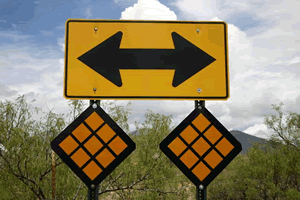Choice and opportunity cost
Choice
Economics, as we are starting to see, is about the making of choices and the taking of decisions. We all have limited resources and have to decide how we are to use them. Good decisions will only be taken if the correct information is available. Even so, the actual decision will be based on non-economic as well as economic considerations. You  are faced with choices and decisions every day, economic choices and decisions which impact on other economic agents. Some examples:
are faced with choices and decisions every day, economic choices and decisions which impact on other economic agents. Some examples:
- Will I spend the majority of my spare time studying economics and my other HL and SL subjects or will I pursue my leisure interests? (Less IB studying, more money spent on leisure, less exam success, greater pressure on your teachers).
- Will I go to college on foot, or will I get Mum to take me in the car? (More pollution from the car, more demand for oil, Mum cannot do anything else whilst she wastes her time driving to and from College).
- Will I buy a new textbook, or another CD? (Cannot have both. How do I decide? Some part of industry gains, the other suffers).
Choices, decisions, consequences, both for the decision taker and many other parts of an economy.
Opportunity cost
When you buy something you exchange cash for a product or service. For most people, cash is relatively scarce. So when it is spent on something it cannot be used to buy something else. This introduces the concept of opportunity cost.
Opportunity cost
The opportunity cost of an activity is the sacrifice made to do it. It is the real cost of the next best alternative foregone. The more a nation produces of one thing, the less of something else it can produce. The sacrifice of the alternative is the opportunity cost.
A few examples:
- The government choose to spend more on health care. This may mean sacrifices elsewhere and may mean less spent on affordable housing. The reduction in housing is the opportunity cost.
- The opportunity cost of working overtime (supplying more labour) is the leisure time that you have sacrificed.
- You own a lawnmower that you rarely use. It has a second hand value of $50. The opportunity cost of keeping the mower is $50.
- You are given $400 as an 18th birthday present. You decide to spend it on a holiday rather than put it into a long - term saving account. The opportunity cost of the holiday is the savings that have been given up.
- You buy a CD instead of purchasing lunches for a week. The opportunity cost of the CD is the lunches given up.
The fact that there is an opportunity cost to every transaction means that we all face trade-offs in the decisions we make. As a society, we cannot have everything we want and so to have more of one thing, we may have to have less of another. This notion of trade-offs is one that will recur throughout your economics course. It will also arise when we look at the management of the national economy as governments face trade-offs as well as individuals. They may want low unemployment and low inflation, but less of one may mean more of the other.
Remember, however, that opportunity cost is not a financial cost - it is a resource cost, i.e. what's given up in real, as opposed to money terms.
To start looking at the next page, click on the right arrow at the top or bottom of the page. To return to the table of contents at any time, just click the 'home' icon.
